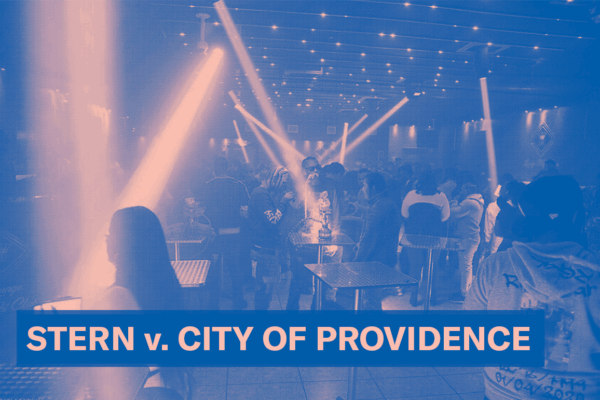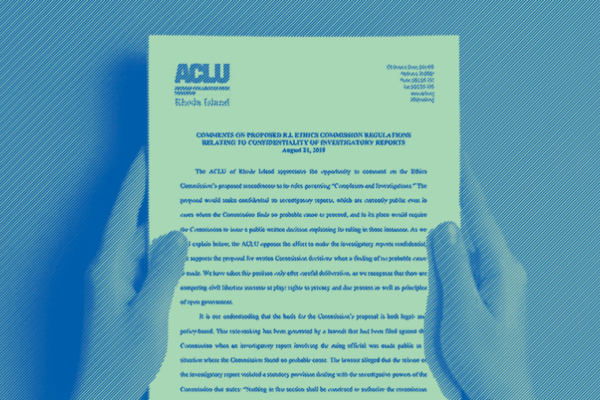Is a New York Times article a confidential document that the City of Providence can withhold from disclosure under the Access to Public Records Act (APRA) on the grounds that it would violate copyright law to release it? That is one of the issues – along with free speech concerns raised by the City’s denial of an entertainment permit to a national rap artist – raised by an open records lawsuit filed by the ACLU of Rhode Island today after the City refused to turn over any documents underlying its decision last year to bar a rapper from performing at a Providence club.
Last October, the Providence Police Department (PPD) requested that the Providence Board of Licenses issue a “cease and desist” order to the “LIT Lounge” to prohibit a performance by the rap artist Jeffrey Alexander (known professionally as “22Gz”) scheduled to take place a few days later. Among other things, the PPD representative told the Board that 22Gz was a member of a gang that “has ties to the Crip Gang,” and that two years earlier, New York police asked an event organizer to remove 22Gz and four other performers from an event because “if they were allowed to perform, there would be a higher risk of violence.”
The Board voted to issue the order requested by the PPD, advising the club that “the Providence Police Department presented numerous incidents of violence at previous performances of this artist. The Board determined that allowing this artist to perform would pose a significant safety threat to your establishment, your staff, your patrons, and the City as a whole.”
Concerned about the possible First Amendment implications of the Board’s actions in banning a rap artist from performing, ACLU of Rhode Island policy associate Hannah Stern filed an APRA request with the City, seeking “any documents provided to the Board of Licenses” regarding incidents of violence at previous 22Gz performances, and “any documents which delineate the specific incidents of violence referenced in the Providence Police Department presentation leading to the denial of this event for the applicant.” The City initially responded by simply providing the ACLU with a link to the City’s Open Meetings Portal for documents filed with the Board of Licenses relating to “LIT Lounge,” and failed to provide any other documents or records, including those detailing “incidents of violence at previous 22Gz performances.”
When the ACLU demanded a further response for those records, the City responded that all relevant documents – including an article from the New York Times – were being withheld on the grounds that they were “required to be kept confidential by federal law or regulation or state law, or rule of court.” As for the NYT article, the City alleged that “copyright law” prevented it from “re-publishing” it in response to the APRA request. The lawsuit, filed by ACLU of Rhode Island cooperating attorney Jeff Levy, claims there is no basis under copyright law for the City’s secretive position in sharing the article. The APRA suit further argues:
“There is significant public interest in the requested records. The City’s decision to prevent 22Gz from performing at Lit Lounge constitutes a prior restraint on speech, which may have been unconstitutional. To the extent that the City maintains that the prior restraint was warranted because of legitimate concerns about public safety, the public is entitled to see the documents and records underpinning that decision.”
The lawsuit asks the court to issue an order requiring the release of all the relevant documents the City has, and that the records be provided at no charge. The suit also seeks imposition of a fine against the City for violating APRA, and an award of attorneys’ fees.
The ACLU’s Stern said today: “Rather than providing documents which could give important context to the order issued by the Board of Licenses, the City has instead chosen to inappropriately conceal the information which led to this decision. The reasoning behind the decisions made by public entities should not be kept secret, nor should the City feel empowered to use irrelevant statutes to hinder and stymie public access to such records.”
ACLU of RI cooperating attorney Levy added: “A rap artist’s songs are a form of speech protected by the First Amendment. If the City prohibits an artist from performing because of a concern about potential violence, it should be prepared to disclose any documents that informed or justified that decision. The City’s decision to withhold information in this case is troubling, as it has implications for both open government and the right to free speech.”


